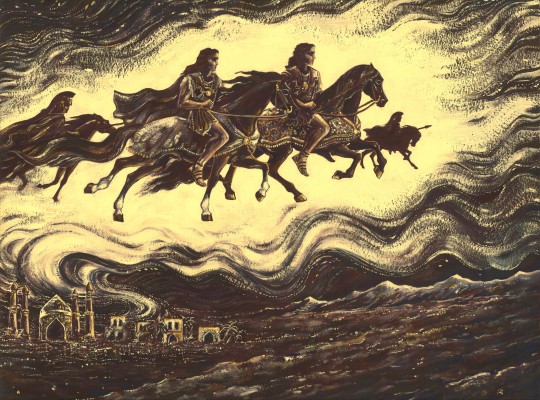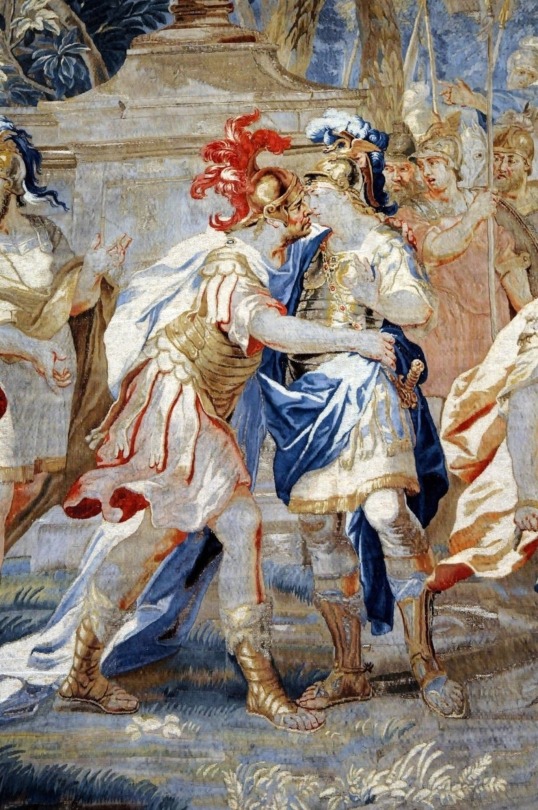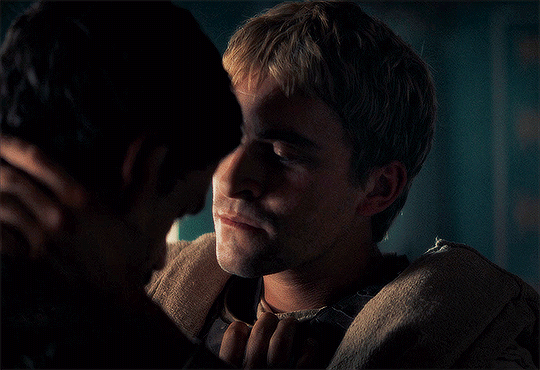#hephaestion
Text
And Alexander Wept for Hephaistion....
If you don’t mind, I wanted to ask, you said something along the lines of: by the time Alexander was coming closer to his death, he had recovered from the grief of Hephaistion’s death (if I’m remembering this correctly; I’m so sorry I have a fuzzy memory) how long do you think he mourned Hephaistion?
------------------
This was an ask via message, so putting it here to reply publicly, as it may be of interest to others.
First, however, I want to mention a pair of articles I wrote many years ago now, but which are still valid:
“The Mourning of Alexander the Great,” Syllecta Classica 12 (2001), 98-145.
“Some New Thoughts on the Death of Alexander the Great,” with Eugene N. Borza (lead author), The Ancient World 31.1 (2000), 1-9. (I wrote the last 1/3 of it.)
The first, in particular, is an in-depth analysis of Alexander’s behavior after Hephaistion died. I’m still rather proud of it, as it brings together two quite diverse fields: bereavement + Alexander studies. If I had a critique for it now, it’s that I didn’t analyze the stories inherent in the primary sources, but that also wasn’t my intention in writing it. I specifically say that I do not plan to pick apart which reports of Alexander’s behavior are likely authentic and which aren’t. My goal was to evaluate all of them in terms of possible evidence of pathological bereavement, according to the (then) DSM III-R (et al.).
TL;DR version of the article: Alexander’s mourning was NORMAL and followed recognized patterns, if one allows for the loss of someone extremely close, a spouse/similar.
Yes, there were complicating factors. BUT he did not go crazy with grief.
Unfortunately, this article is far less known than the “An Atypical Affair” article on Alexander and Hephaistion’s relationship. That’s too bad, as the “His grieving was extreme!” persists among even some of my colleagues, never mind those outside the field of Macedoniasts. (It’s also admittedly possible that they were simply unconvinced by my arguments, but in that case, one usually cites and says so.)
If I could put a giant blinking neon light on one of my earlier articles to get it more attention, that would be the one I’d point to.
The second article—or my 1/3rd of it anyway—deals with the possible effects of deep mourning on the immune system of adult males of Alexander’s age group. Yes, according to some limited research, it does have an impact that increases susceptibility to infectious disease. Add his poor overall physical health after all those battles (and Macedonian-style symposial drinking), and he was just too spent to fight off the typhoid or malaria or whatever fever disease got him.
Ergo, he died roughly 8 months after Hephaistion. We don’t have a date for the latter’s death, but sometime in October or November of 324 BCE is the window. Alexander died June 10th, 323 … or possibly a day or so later if he were in a paralysis too deep for his breathing to be ascertained. (As per Gene’s part of the article.)
The dating is important, as it affects where he (probably) was in his mourning process.

Mourning follows a somewhat predictable pattern, and one of the biggest mistakes made by those unfamiliar with human mourning is to underestimate (often by a lot) just how long mourning takes … even perfectly normal, healthy mourning.
For a major loss, main mourning takes up to a year. No joke. That’s why bereavement counselors try to keep the bereaved from making any permanent decisions within that year. They’re still very much being buffeted by the winds of grief, even if they want to pretend they aren’t. But even after the year anniversary—and marking it with some sort of formal ceremony helps!*—mourning continues off-and-on (sometimes really intense for a few hours or even a few days) for up to 5 years. Again, no joke. Some bereavement studies experts don’t really consider a person truly recovered (note I never say “over it”) for as long as 10 years.
Additionally, ANY deep loss triggers mourning; it doesn’t have to be death. A divorce will result in mourning, even if the people in the marriage wanted to divorce. It’s still a “death” of sorts. Moving some distance away, graduation, and retirement can all set off mourning. This surprises people, that mourning can attach even to “happy” circumstances. Anything that includes an ending will set off mourning, albeit it may not be that intense.
But THE #1 and #2 most devastating losses are the loss of a child and the loss of a spouse/spouse-like figure. Period.
So, a slight correction to the question, I didn’t say he’d recovered from his mourning, but that he was beginning to emerge from the deepest parts of mourning.
What do I mean by that? There are (roughly) 3(-4) major phases of mourning. The speed at which we pass through these varies, dependent on the type of death and our closeness to the deceased. (The first article goes into that in more depth.)
Shock phase, which is typically anywhere from a few days to about 2 weeks.
Deep mourning phase, where the bereaved must come to terms with the loss. The bereaved cycles through a series of stages (not the best term) and, more importantly, struggles with certain TASKS of mourning (as per Worden). Again, the length of this phase can vary, but for serious losses, it can take up to 8-9 months, with the worst of it usually hitting 3-6 months. There is an intense focus on the deceased and the bereaved person may want little to do with new people and vacillate between wanting to talk a lot about the deceased or wanting to give away all their stuff because it’s too painful. Anger, bargaining, depression, self-blame … all are typical of this phase. It’s INTENSE. It really does take months, and people routinely underestimate it.
Re-emergent phase, where the bereaved begins to take an interest again in the external world, may make new friends and new plans that don’t involve the deceased. The deceased is far, far from forgotten, but the bereaved is learning to live without the dead person.
Continued bereavement would be a fourth phase past the one-year anniversary, where the bereaved will still experience grief, sometimes very intense when triggered by a particular memory, a birthday, or anniversaries. But the overall “worst” part of mourning is past.
Finally, especially in the deepest part of mourning, the depression felt by the bereaved is on par with clinical depression, but (except for rare cases) the bereaved absolutely should not take or be prescribed antidepressants as these interrupt the mourning process.
Yes, it hurts like hell but one can only go through, not over, around, or under. Through.
In some cases, however, bereavement becomes “complicated,” resulting in what’s referred to as pathological bereavement, by which I mean only not normal (I wouldn’t even say abnormal). Sudden death (as with Hephaistion) IS one factor that can complicate mourning, but it doesn’t necessarily lead to full-blown pathological grief. In the article, I evaluate all Alexander’s listed behaviors and explain why my final conclusion is that his bereavement was sharp, but not pathological.
Alexander’s behavior in the last few months showed aspects of the third phase. He was planning (or probably returning to planning) his next campaign and thinking about improvements to the city of Babylon apparently with the intention of making it his eastern capital. Yes, he was also planning Hephaistion’s funeral, but the other two things were new and show re-engagement.
So Alexander’s mourning had not ended before he died himself, only shifted. Even if he’d lived another 5 years, he’d still have experienced bereavement off and on.
Remember, grieving takes TIME. More time than you expect.
If you know someone going through grief, especially for a family member, beloved, or very close friend … give them space. Let them cry. Encourage them to talk about the lost person if they want to, but don’t force it if they don’t want to. Don’t argue with their theology/beliefs about death or their gallows humor, but also don’t shove your theology/beliefs about death, or your gallows humor, onto them. Read the room.
MOST OF ALL, JUST BE PRESENT. It matters less what you say than that you’re there. They may not even remember what you say later; they will remember you showed up.
—————-
* In fact, world cultures that have traditional, one-year anniversary ceremonies routinely show better outcomes for mourning individuals.
#asks#Alexander the Great#Hephaistion#Hephaestion#death of Hephaistion#death of Hephaestion#Mourning of Alexander the Great#bereavement#mourning#tasks of mourning#stages of grief#Alexander the Great's grief#alexander x hephaestion#alexander x hephaistion
27 notes
·
View notes
Text













Besides, you'll be by my side, right? Till the bitter end.
Alexander the Great and Hephaestion in Alexander: The Making of a God (2024)
#alexander the making of a god#alexander the great#hephaestion#dailymengifs#perioddramaedit#perioddramagif#alexander x hephaestion#buck braithwaite#will stevens#mine#historically accurate tbh#this could have been a smaller gifset. but it isnt.#1k
5K notes
·
View notes
Text




Ptolemy tired of thirdwheeling Alexander and Hephaestion in Episode 1: The Boy King
Alexander: The Making of a God (Netflix, 2024)
#alexander the great#hephaestion#alexander x hephaestion#alexander the making of a god#buck braithwaite#will stevens#perioddramaedit#netflixedit#mygifs*#makingofagod*#tv: alexander the making of a god#pls this was so funny
3K notes
·
View notes
Text


The mural of Achilles, and the temple of Amun.
Private commissions, please don't use for yourself.
1K notes
·
View notes
Text

Spirits of ancient battles. Memories of Alexander the Great (2023/2024)
Gouache version of the work from 2017: https://www.tumblr.com/marysmirages/686070565494259712/spirits-of-ancient-battles-memories-of-alexander?source=share
#alexanderthegreat#hephaestion#hephaistion#alexander of macedon#marysmirages#asia#ancient greek mythology#painting#art#horse#rider#mirage#oasis#persia
403 notes
·
View notes
Text

Alexander the Great kissing Hephaestion
Tapestry at Hampton Court Palace, London.
#alexander the great#hephaestion#tapestry#alexander x hephaestion#art#homoerotic#men in art#male art#gay art#mlm#gay#lgbt#ancient greece#history#gay history#lgbt history#hampton court
235 notes
·
View notes
Text
do u guys think that hylas, patroclus, hephaestion and hyacinthus are friends in elysium...
i bet they have a group chat on twitter called "support group for emos who dated murder blondes" where they gossip every day ...
#robb screams into the infinite void of chaos#“but apollo doesnt kill anyone” um yes the fuck he does#achilles#the song of achilles#the iliad#tsoa#patrochilles#patroclus#song of achilles#hyacinthus#apollo and hyacinthus#greek pantheon#apollo#hephaestion#alexander the great#heracles#greek mythology#hylas
661 notes
·
View notes
Text










Interviewer: Are you very fond of Alexander?
Gene Roddenberry: As a matter of fact, I am. I have Mary Renault's new Oxford book―in fact, I'd have everything in the bookstores a few years ago. Passionate admirer of Alexander. Passionate man. [...]
Interviewer: There's a great deal of writing in the STAR TREK movement now which compares the relationship between Alexander and Hephaistion to the relationship between Kirk and Spock―focusing on the closeness of the friendship, the feeling that they would die for one another―
Gene Roddenberry: Yes. There's certainly some of that with―certainly with love overtones. Deep love. The only difference being, the Greek ideal―we never suggested in the series―physical love between the two. But it's the―we certainly had the feeling the affection was sufficient for that, if that were the particular style in the 23rd Century. [He looks thoughtful] That's very interesting. I never thought of that before.
[From Shatner: Where No Man (1979)]
Sooo I watched the new docuseries Alexander: The Making of a God and I was hit by indirect Kirk/Spock feelings because I remembered this interview. And of course I had to make a gifset about it. :)
#spirk#alexander x hephaestion#star trek tos#alexander: the making of a god#star trek the original series#james t. kirk#spock#k/s#kirk x spock#space husbands#alexander the making of a god#alexander the great#hephaestion#my gifs#hephaistion#alexander x hephaistion#gene roddenberry
239 notes
·
View notes
Text

#ai art#male art#true romance#alexander the great#hephaestion#gay love#gay joy#gay warriors#gay history#gay art#gay
347 notes
·
View notes
Text
fellas is it gay to visit the graves of achilles and patroclus with your personal bodyguard/bff who you named second in command to your empire and compare yourself to achilles and him to patroclus and also lose your mind when he dies and die yourself not eight months later
#other things alexander the great has done:#kiss a eunuch in public#was apparently ‘keen on boys’#he and hephaestion actually laid flowers on patrochilles’ graves#married once for love then twice more for politics but treated his wives with respect and didn’t force himself on them#(surprisingly great behavior for the time)#this man is very bisexual#alexander the great#hephaestion#achilles#patroclus#patrochilles#song of achilles
861 notes
·
View notes
Text
i'm not the only one who watched that new alexander the great series and completely absolutely irrevocably hyperfixated on hephaestion and alexander right... right......
151 notes
·
View notes
Text
Hephaestion must be rolling in his 2,348-year-old grave knowing that he's the cause of homophobic dudebros crying on twitter rn 🤭




#the tears of homophobes are always delicious#alexander the great#hephaestion#hephaestion amyntoros#alexander: the making of a god#netflix#ancient greece#history
161 notes
·
View notes
Text





"But the fates of death await us. So we either give our enemy glory…"
"Or win it for ourselves."
Alexander the Great and Hephaestion in Alexander: The Making of a God (2024)
#alexander the making of a god#alexander the great#hephaestion#perioddramaedit#perioddramagif#alexander x hephaestion#buck braithwaite#will stevens#mine#a lot could be said about how they portrayed their relationship and especially hephaestion's character but well. at least they were gay!#they were constantly headbutting which is really sweet i love a good headbutt of love
992 notes
·
View notes
Text




Alexander and Hephaestion in Episode 1: The Boy King
Alexander: The Making of a God (Netflix, 2024)
#alexander the great#hephaestion#alexander x hephaestion#alexander the making of a god#periodramaedit#netflixedit#buck braithwaite#will stevens#mygifs*#makingofagod*#tv: alexander the making of a god#guys... they were only fighting okay#this is very sfw#😇😇😇
2K notes
·
View notes
Text

Any ideas?
#historical memes#history#history memes#meme#memes#historical#ancient history#Ancient Greece#Greek history#Ancient Greek history#macedon#Macedonia#Alexander#Alexander the great#alexander of macedon#Hephaestion#Hephaestion and Alexander#there I told you#I fucking love them
227 notes
·
View notes
Text
why do all the people named alexander need a boypal they have to be close with??
like, you got alexander the great? boom you got hephaestion.
you have tsar alexander of russia?? you gotta have napoleon.
you have alexander hamilton?? get a john laurens to go w that.
#appl talks#history#alexander hamilton#alexander the great#tsar alexander i#hamilton#historical lams#hephaestion#ancient macedonia
233 notes
·
View notes